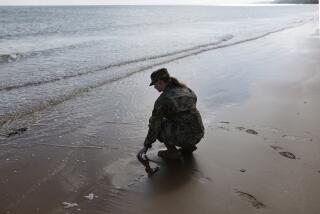Vintage Planes Roar Again to Mark Battle of Britain
- Share via
LONDON — Spitfires and Hurricanes from Britain’s “finest hour” in 1940 joined with jets representing the country’s Persian Gulf force on Saturday in a salute to the Battle of Britain.
The procession of 168 aircraft flew over Buckingham Palace, where Queen Elizabeth II and Prince Phillip were waiting on the balcony at noon. Also in the royal party was Prince Harry, son of Prince Charles, who was celebrating his 6th birthday.
King Baudouin and Queen Fabiola of Belgium, and Princess Juliana and Prince Bernhard of the Netherlands represented Britain’s wartime allies. Prime Minister Margaret Thatcher and members of her Cabinet watched from another stand.
The flight marked the 50th anniversary of the turning point of the battle. On Sept. 15, 1940, the Royal Air Force inflicted heavy losses on the Luftwaffe as it staged a daylight attack on the capital. Two days later, Adolf Hitler suspended plans for an invasion of Britain.
The 300 pilots and navigators were led by Air Vice-Marshal Bill Wratten, commander of 11 Group, which fought the Battle of Britain in the summer and autumn of 1940. Wratten piloted a Spitfire Mark 2 credited with shooting down three German aircraft.
Two Hurricanes and five Spitfires from the Battle of Britain Memorial Flight led the cavalcade, which included the Red Arrow acrobatic team, a Lancaster bomber and some of the Tornado F3 jets like those deployed with the multinational forces in the gulf.
On the ground, there was a parade of 1,400 Royal Air Force, Royal Auxiliary Air Force, Royal Air Force Volunteer Reserve, Royal Observer Corps, Air Training Corps and other groups escorting the standards of the 17 Battle of Britain squadrons still in operation.
The Canadian, Australian and New Zealand air forces also were represented.
Also taking part were representatives of the Fire Brigade, Metropolitan Police and the Ambulance Service, which fought their own battles in 1940 against fires and explosions during the bombing.
A total of 534 air crewmen--one in six--were killed during the battle and many others were seriously injured. The RAF lost 1,017 aircraft and Germany’s Luftwaffe lost 1,882.
After the battle, Winston Churchill paid his famous tribute to the victors: “Never in the field of human conflict was so much owed by so many to so few.”
It was Britain’s resistance to the German onslaught early in World War II that Churchill called the nation’s “finest hour.”
More to Read
Sign up for Essential California
The most important California stories and recommendations in your inbox every morning.
You may occasionally receive promotional content from the Los Angeles Times.












